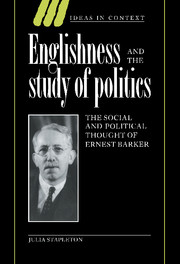Book contents
- Frontmatter
- Contents
- Acknowledgements
- Introduction: The ‘national character’ of Barker's thought
- 1 Lancashire, Idealism, and Whiggism: the making of an English political scientist
- 2 The polis, law, and the development of political studies at Oxford, 1900–1920
- 3 Society and the state in the English national past: the lure of Pluralism
- 4 Statehood, nationhood, and internationalism: English political theory and the First World War
- 5 Education and national character: the milieu of King's College London
- 6 ‘Continental’ political science and the Cambridge Chair
- 7 Traditions of civility: the construction of Englishness in the Second World War and beyond
- 8 The expansion of Englishness: the Books Commission, Europe, and the Commonwealth
- Conclusion: A late-Victorian liberal-conservative
- Select Bibliography
- Index
- Ideas in Context
6 - ‘Continental’ political science and the Cambridge Chair
Published online by Cambridge University Press: 11 September 2009
- Frontmatter
- Contents
- Acknowledgements
- Introduction: The ‘national character’ of Barker's thought
- 1 Lancashire, Idealism, and Whiggism: the making of an English political scientist
- 2 The polis, law, and the development of political studies at Oxford, 1900–1920
- 3 Society and the state in the English national past: the lure of Pluralism
- 4 Statehood, nationhood, and internationalism: English political theory and the First World War
- 5 Education and national character: the milieu of King's College London
- 6 ‘Continental’ political science and the Cambridge Chair
- 7 Traditions of civility: the construction of Englishness in the Second World War and beyond
- 8 The expansion of Englishness: the Books Commission, Europe, and the Commonwealth
- Conclusion: A late-Victorian liberal-conservative
- Select Bibliography
- Index
- Ideas in Context
Summary
PROFESSOR OF POLITICAL SCIENCE
How long Barker would have stayed at King's College London had a new Chair of Political Science not been founded at Cambridge in 1927 is an open question. He had certainly grown tired of the constant pressure of affairs by that time and desired a return to the quieter life of scholarship. It does not seem, however, that he was particularly anxious to secure the Cambridge Chair which was funded by the Laura Spelman Rockefeller Memorial of New York. In his statement to the Council of King's College on his resignation he emphasised that he had (at first?) refused to be a candidate for the Chair although he had been pressed to allow his name to go forward. When offered the Chair, he felt it was his duty to accept. By explaining his resignation in this way, he was evidently concerned to avoid offending those with whom he had worked closely in the college. Nonetheless, there was an ambivalence in his attitude to the post which made his hesitation in applying a very real one. His doubts about the Chair must have centred especially on its title; whilst he had readily envisaged himself as a Professor of Political Theory and Institutions at Oxford two decades earlier, the role of Professor of Political Science was less appealing. This emerged in his inaugural lecture, where he expressed considerable scepticism about the scientific status of his subject.
- Type
- Chapter
- Information
- Englishness and the Study of PoliticsThe Social and Political Thought of Ernest Barker, pp. 128 - 153Publisher: Cambridge University PressPrint publication year: 1994



